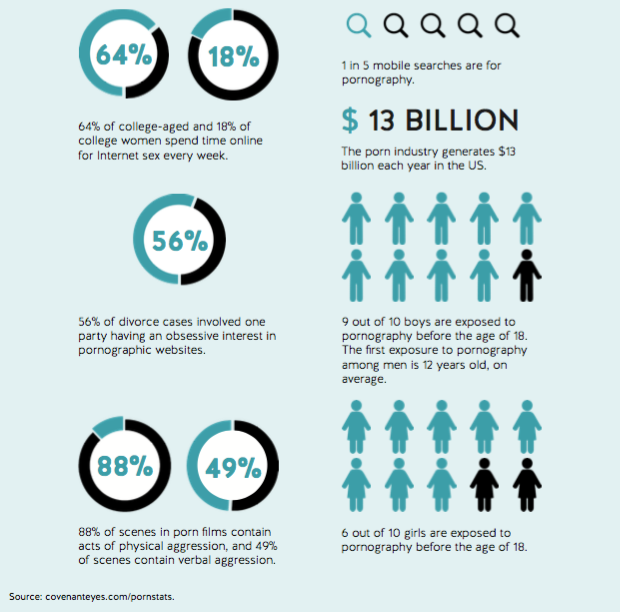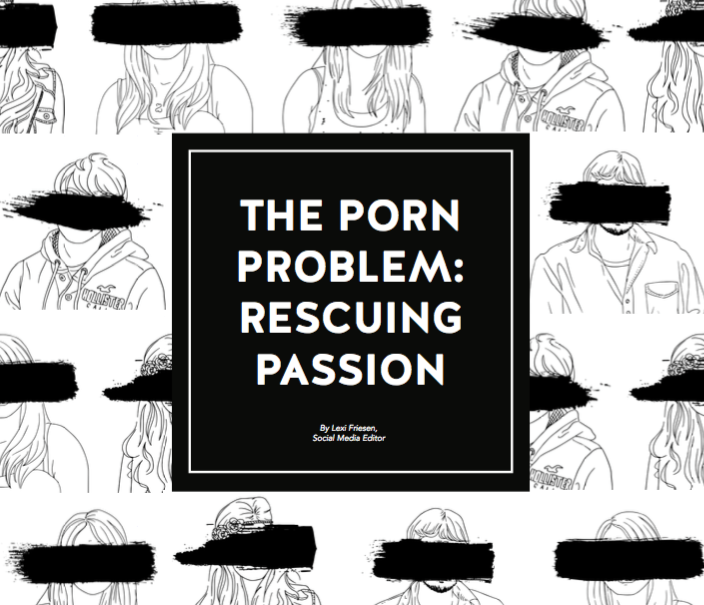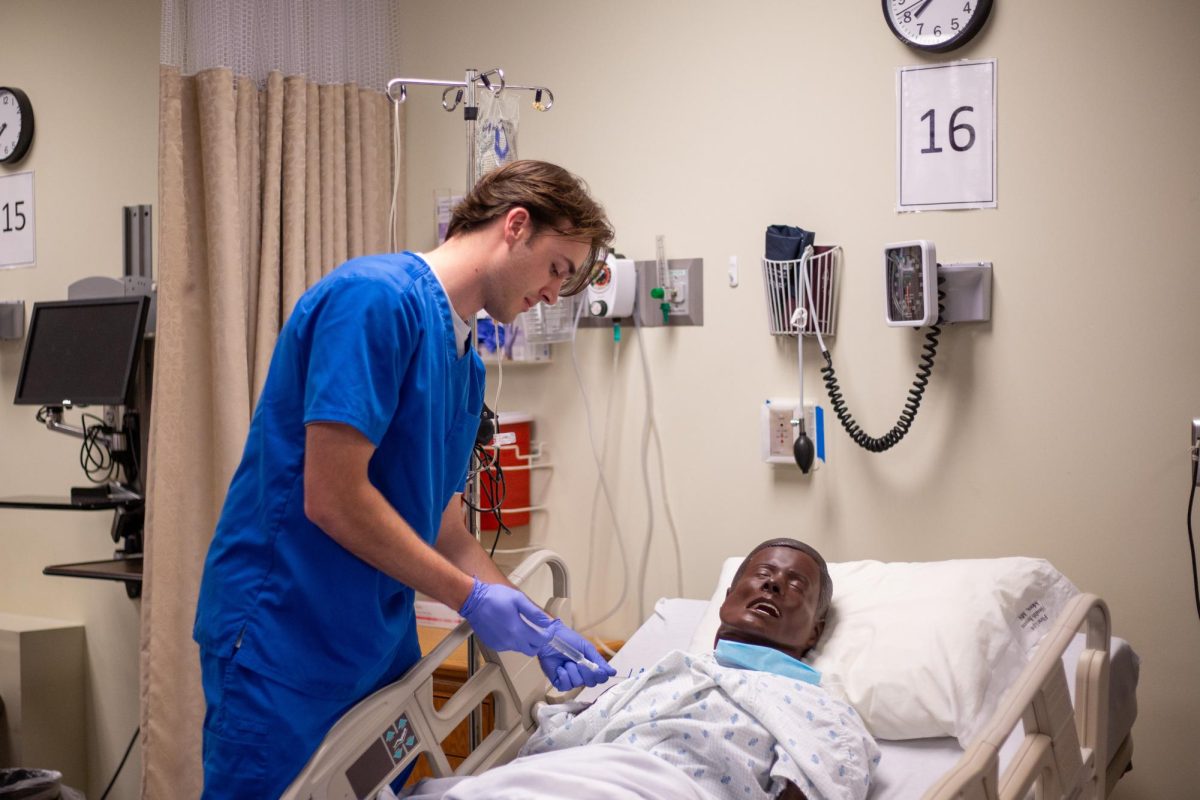A continued conversation on pornography, as students share experiences of freedom.
By Lexi Friesen
JT Thweatt leaned back in his chair as he spoke, “It was the summer going into highschool and I got an iPod touch.”
A habit that started out “soft” for Thweatt, he started out only viewing videos on YouTube before his habit worsened. He describes the time in his life as a time when he was curious and just beginning to notice girls and women. Through the iPod touch, access was easy and hidden from anyone else.
“There were these desires and urges and lack of knowledge, and I didn’t know what to do with them,” Thweatt explained. Pornography brought immediate gratification and he didn’t think he was hurting anyone else.
On April 6, Bethel held a student panel on the subject of pornography. Campus Pastor Laurel Bunker served as a mediator on the panel as students JT Thweatt, Rachel Cole and Jenny Mawhorter took the stage to openly discuss their struggle with pornography and the affect it had on their lives.
The idea came to Bunker after what she calls an “avalanche of students” came to her around the same time wanting to talk about pornography. Bunker reached out to Cole, who had shared her testimony previously in the fall at Koinonia. Mawhorter and Thweatt shared their stories with Bunker during that time and said they felt ready to share with others as well. Since then, more students have stepped forward willing to be authentic with the Bethel community.
“I was five years old,” Jenna Rylaarsdam recalls.
She nods her head, slowly remembering how her addiction to pornography began. For Rylaarsdam, it was her family that exposed her first to pornography. She had several family members who were addicted to pornography. It is what she calls a “generational sin” in her family. Pornography provided her with a temporary escape from the isolation and loneliness that she felt in her own life.
“I was probably 12 or 13 years old,” Tyler Meyer said. “It started out as movie scenes on YouTube and there’s always the ‘related clips’ on the side. I was curious at first, but then it led to me going back to those videos when I didn’t want to.”
Covenant Eyes, a company that sells Internet accountability software, created a statistical book regarding information about pornography worldwide. Their 2015 edition included information on pornography as a business and pornography in families, marriages, young adults and teenagers.
 On any given day, millions of people are subjected to soft-core pornography through marketing, social media and billboards. A 2007 survey of 13 and 14 year-old students discovered 90 percent of boys and 70 percent of girls had viewed sexually explicit videos at least once in their lifetime. Of the 90 percent of boys, 35 percent said they had watched pornography “too many times to count.” According another survey in 2014, 21 percent of 18 to 30 year old women and 63 percent of 18 to 30 year old men view pornography several times a week.
On any given day, millions of people are subjected to soft-core pornography through marketing, social media and billboards. A 2007 survey of 13 and 14 year-old students discovered 90 percent of boys and 70 percent of girls had viewed sexually explicit videos at least once in their lifetime. Of the 90 percent of boys, 35 percent said they had watched pornography “too many times to count.” According another survey in 2014, 21 percent of 18 to 30 year old women and 63 percent of 18 to 30 year old men view pornography several times a week.
Joel Frederickson, Professor and Chair of the Psychology Department and Associate Dean of Institutional Assessment and Accreditation, is charged with conducting in-house Bethel surveys.
A spring 2013 survey on pornography at Bethel revealed nearly 30 percent of seniors view pornography at least once in awhile. Male students at Bethel were more likely to watch pornography compared to women. The internet is the leading source for pornography for Bethel students.
Bunker has two teenage daughters. She raises questions that people have regarding sex and sexuality that aren’t always answered: How do you know what to do when your hormones kick in but there is nowhere to turn? What happens when you feel pressured or want to have sex but know it is reserved for marriage? How do you deal with it if sex or pornography is forced upon you?
“I am determined to talk to my daughters without weirding them out,” Bunker said. Her main goal is to be approachable when it comes to the subject. “We hang out just us girls and have had a free for all discussion. It’s been great for us.”
Recent research shows the effects of pornography on the brain and society. Dann Aungst, author of From One Addict to Another and certified Addiction Counselor, wrote a blog post for Covenant Eyes titled “4-Non Biblical Reasons Porn is Ruining Your Life.” Aungst explained how the human brain contains a chemical called dopamine, which carries information relating to emotions, cravings and a sense of pleasure. When people watch pornography, dopamine becomes “super charged” in the brain causing an artificial high, which then makes the brain become fatigued. The inability to bond with the computer screen leaves the brain unsatisfied and results in a desire to continue watching.
Meyer said he felt empty during his junior year of high school. His sleep schedule was difficult because he stayed up late to watch pornography, but was up early for baseball practice and school.
“My parents kept asking me if I was okay,” he said. “They would sit me down and try to have a conversation with me. They would ask ‘What makes you feel passionate,’ or ‘What are you looking forward to in the future,’ and I didn’t have an answer.”
Meyer closes his eyes.
As pornography brought instant gratification, Meyer thought it was filling his emptiness. Instead, it only made him feel more ashamed. It wasn’t until later that he realized only God could fill his emptiness.
“When I took pornography out of my life, I needed something to fill that hole of loneliness. For me, it was a lot of prayer,” Rylaarsdam said.
Bunker encourages students to come and talk with her about their struggle with pornography. Allowing students to speak in chapel is one way Bunker believes Bethel can become a “shame-free zone.”
“I think people believe that they are alone,” Bunker said. “But porn is made to be addictive and like any addiction it may seem to start harmless but it evolves into more dark and grotesque forms. Once a person gets in deep, the shame I think must be immense, reinforcing the lies.”
When I took pornography out of my life, I needed something to fill that hole of loneliness. For me, it was a lot of prayer. Jenna Rylaarsdam
Adjunct psychology and seminary professor Dan Rotach also works as a marriage and family counselor. He has experience counseling married couples where either one or both partners are viewing pornography. He said pornography is damaging to marriage and dating relationships because it gives unrealistic expectations of sexual performance and body image.
“Nobody has an orgasm every thirty seconds,” Rotach shakes his head. “No one can duplicate pornography and expect that to be normal in a marriage. No one has perfect features. Pornography hijacks the brain and as it gets addictive, a new high is needed and more graphic images are needed to achieve that high.”
Luke Gilkerson is an author for Covenant Eyes and has a BA in Philosophy and Religious studies. In one of his articles, Porn 101: College Campuses Using Porn in the Classroom, Gilkerson discusses his study on college campuses. He found many college women say “they can’t compete (with pornography), and they know it.”
Research shows that people who frequently use porn develop cynical attitudes specifically towards love and often develop trust issues between dating and marriage partners.
Rylaarsdam found pornography affecting her relationships with all people.
“Pornography kept me from seeing people as people. I viewed relationships as a means to something or a function for something. It kept me from loving people,” she said. “And when I found out sex trafficking was a part of the industry, I didn’t want to believe it.”
Thweatt describes pornography as “a vicious cycle.” The shame people feel after watching pornography drives them into isolation and in isolation there is no accountability, making it harder to say no when tempted with pornography, resulting again in shame.
“There are several myths I’ve heard over the years,” Rotach said. “I heard a public speaker say that if wives would simply ‘give it up more’ their husbands wouldn’t struggle as much with pornography. That’s BS. The second myth people believe is that pornography will go away once couples are married.”
Rylaarsdam became a Christian during her sophomore year of high school and attended a winter retreat with her youth group. The speaker kept bringing up pornography and on the last night stated that he felt there was someone who needed to hear the message.
“I was like, ‘Oh crap, that’s me,” Rylaarsdam said.
That night, she spent time confessing to the Lord about her struggle with pornography. For two years after, though, she still told no one. During that time, she explains that shame was her reason for not turning back to pornography. It wasn’t until she came to Bethel that she finally began sharing her struggle with people.
“I think it was a combination of late nights, being alone and laptop access that made me feel tempted again, so I knew I needed to share with people,” she explained.
The first time Meyer had an open conversation about his struggle with pornography was his freshman year at Bethel. Through SHIFT, Meyer was able to share his testimony and hear others tell their stories. His shift leaders and freshman floor began reading the book Lust Free Living.
There were about 12 to 15 people at SHIFT that night. He realized he wasn’t alone in the fight. Meyer says he could felt his heart beating faster and faster until it was his turn to share.
“I was so nervous but my leaders and many of my friends shared about their struggles with lust. I followed their incredibly bravery and vulnerability,” he said.
Meyer admitted that it was hard to be vulnerable but through weekly accountability meetings he found freedom in Christ. After several weeks, Meyer asked his SHIFT leaders if he could share his whole story. It was 2 Timothy 2:22 that helped Meyer along in his journey.
As a SHIFT leader this year, Meyer tries to implement sharing with his floor by being a vulnerable leader. He shares the importance of leaders paving the way and sharing their stories so that others can feel safe in sharing their struggles.
“We are called to run away from evil desires and run towards God and run with other Christians.” Meyer explained. “As Christians united in Christ we must each other along in our battles.”
Rotach emphasizes the need for open conversations.
“We (churches, Christians and the Bethel community) need to create safe venues to hear people’s stories. It needs to be okay to say, ‘I have a problem,’” he said.
While Rylaarsdam, Thweatt and Meyer have experienced freedom, there are still days that are harder than others.
Rylaarsdam points out methods that have helped her such as not going on her computer late at night, or choosing to not go to certain movies with friends.
“You can’t do it alone – it’s hard and awkward and I get it. I was in the same boat, but we need to be bold,” Meyer said.
Through his years counseling others, Rotach said that finding accountability is only the first step. The second step is figuring out why – why does someone access porn? While it’s different for every person, some of the reasons include loneliness, desire for intimacy and shame.
Thweatt leans forward in his chair, hands clasped.
“I want people to know there is hope,” he said. “There is freedom from pornography. Even in the midst of failure, God will not leave you and He will not forsake you. God is calling you to so much more – it’s going to be hard, but it will be worth it because victory in Christ is sweet.”
Resources and other studies:
http://beggarsdaughter.com/
http://www.covenanteyes.com/blog/
http://guiltypleasure.org/
http://www.fightthenewdrug.org/
https://www.barna.org/blog/culture-media/david-kinnaman/the-porn-phenomenon#.VyozuGZmhox
References
Aungst, Dann. (2016, April 12). 4 Non-Biblical Reasons Porn is Ruining Your Life. Retrieved April 16, 2016
Gilkerson, L. (2008, October 31). Porn 101: College Campuses Using Porn in the Classroom. Retrieved April 22, 2016, from http://www.covenanteyes.com/2008/10/31/porn-101-college-campuses-using-porn-in-the-classroom/
Pornography Statistics. (2015). Covenant Eyes. Retrieved April 22, 2016, from www.covenanteyes.com/pornstats/.

![Nelson Hall Resident Director Kendall Engelke Davis looks over to see what Resident Assistant Chloe Smith paints. For her weekly 8 p.m. staff development meeting in Nelson Shack April 16, Engelke Davis held a watercolor event to relieve stress. “It’s a unique opportunity to get to really invest and be in [RAs’] lives,” Engelke Davis said, “which I consider such a privilege.”](https://thebuclarion.com/wp-content/uploads/2024/05/041624_KendallEngelkeDavis_Holland_05-1200x800.jpg)

















Luis Young • Jun 6, 2016 at 2:25 am
Thank you for this review, it is very useful information.